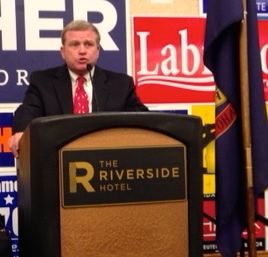It’s a scene from a policy wonk’s alternate universe. A proposed constitutional amendment — addressing the arcane topic of agency rules — sparks a heated debate among some of the state’s most prominent politicians.
Yet this scenario is unfolding this fall, before Idaho voters decide the fate of House Joint Resolution 5.

And if voters aren’t exactly riveted to this issue, Idaho’s politicians certainly are. Supporters say HJR 5 will protect an important check and balance — the Legislature’s ability to approve or reject agency rules — by addressing it in the state Constitution. Opponents call HJR 5 a legislative power grab, rejected by voters just two years ago.
Either way, the outcome of the Nov. 8 vote will affect the state’s rulemaking process. In recent years, rules have addressed some of Idaho’s most important education topics, from teacher pay to academic standards.
A civics lesson
During the opening weeks of the legislative session, committees spend hours poring over docket books of agency rules. This is often a tedious process, and it’s an uncommon practice.
The Idaho Legislature has the power to reject an agency’s rule. For example, if the House and Senate education committees reject a rule from a state education agency, it’s dead for the year. But it only takes one House or Senate committee to pass a rule, and if it passes, the rule has the force of state law.
Not surprisingly, most Idaho legislators covet their unique influence over the rulemaking process. And HJR 5 would essentially give the Legislature unilateral veto power over agency rules. In March, HJR 5 quickly passed both houses, easily clearing the two-thirds majority needed to approve a constitutional amendment.
However, voters must ratify constitutional amendments as well. A simple majority is needed to pass HJR 5.
And HJR 5 supporters are leaving nothing to chance. They have secured endorsements from nearly a dozen agriculture and industry groups. The pro-HJR 5 campaign collected more than $30,000 in contributions from May 28 through Sept. 30, including $11,200 from sitting legislators.
Why it matters
The rulemaking process often seems like Statehouse inside baseball, and sometimes it is.
But sometimes, high-profile policies are made, or remade, through the rules process.
- In 2011, the House and Senate education committees approved the Idaho Core Standards, the state’s version of Common Core. That’s why there is no recorded House or Senate floor vote on Common Core; it wasn’t necessary.
- In 2014, the education committees rejected a controversial tiered teacher licensure rule. With that proposal off the table, education groups and key lawmakers worked to hammer out the state’s career ladder law to boost teacher pay. That law remains in place today.
- Earlier this year, lawmakers rejected a rewrite of school science standards — which are now on hold, perhaps until 2018. Some legislators accused state officials of short-circuiting the public comment process. But some concerns centered on the standards themselves — which included references to evolution, the age and creation of the universe and humans’ role in climate change.
In other words, administrative rules are routine. Until they aren’t.

Still, education leaders are steering clear of the debate over HJR 5.
Through a spokesman, state superintendent Sherri Ybarra declined to take a stand on the amendment, even though the outcome could affect the rulemaking process for her State Department of Education.
Also on the sidelines are the state’s three most prominent education lobbying groups: the Idaho School Boards Association, the Idaho Association of School Administrators and the Idaho Education Association. However, the IEA voiced some reservations.
“The organization firmly believes in separation of powers, and any action that might be taken to undermine that separation can be considered problematic for the IEA,” the teachers’ union said in a statement Wednesday.
A power grab?
When it was time for legislators to vote on legislative authority, the outcome wasn’t even close. HJR 5 passed the House 62-3 and the Senate 34-1.
Those lopsided floor votes did nothing to foreshadow the debate unfolding this fall.
Attorney General Lawrence Wasden has been perhaps the most visible critic of HJR 5. In a guest opinion in the Idaho Statesman, the Republican Wasden accused the GOP-dominated Legislature of engineering a “power grab.” If HJR 5 passes, a governor would not be able to veto the Legislature’s decisions on rules, and the rulemaking process would essentially be shielded from judicial review.
Wasden saved his harshest words for the process — pointing out that Idaho voters narrowly rejected a similar amendment in 2014.
“The primary reason for resubmitting this constitutional amendment is that ‘the voters didn’t know what they were doing and voters need to be educated better,’” said Wasden.
But the HJR 5 guest opinion has become a cottage industry of sorts, with politicos lining up on both sides of the debate.
Moscow Democrat Dan Schmidt, the only state senator to oppose HJR 5 in March, confessed to a conversion on the issue. He voted for the 2014 version of the amendment on the floor, then opposed it at the ballot box. In a guest opinion posted by the Spokane Spokesman-Review, Schmidt said HJR 5 would “shift the balance of power toward an already arrogant Legislature.”
HJR 5 supporters include U.S. Sen. Jim Risch, a longtime former state senator; in an Idaho Statesman guest opinion, Risch argued that the amendment would protect legislative authority from the clutches of an “activist court.” In the pages of the Wall Street Journal, Wayne Hoffman of the conservative Idaho Freedom Foundation said legislators have saved residents from “a slew of laughable and business-unfriendly restrictions.”

But amid the tug of war over political power, House Speaker Scott Bedke has tried to paint HJR 5 in populist terms. In his guest opinion on the topic, published in the Twin Falls Times-News, Bedke urges voters to make sure they have a say in the rulemaking process.
“Because agencies sometimes don’t understand the real-life impact of their regulations, we ask everyday citizens — you and your neighbors — to tell us how the new rules affect them,” said Bedke.
Disclosure: The Idaho Land Fund has endorsed HJR 5. J.B. Scott is affiliated with the Idaho Land Fund. He is also board chairman of the J.A. and Kathryn Albertson Family Foundation, which funds Idaho Education News.
